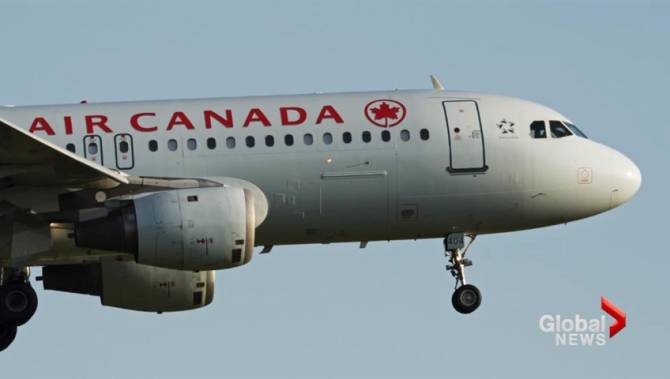
A passenger rights advocate is appealing a court decision that dismissed a claim by a woman who was denied boarding on an Air Canada flight and then told she may have to sit apart from her young daughter on another flight.
Gabor Lukacs said Wednesday that he filed legal briefs on behalf of Nicole Paine, who was travelling with her two-month-old twins, three year-old daughter, her mother and a dog in December 2016 as they relocated from Vancouver to Sydney, N.S.
READ MORE: Halifax woman suing Air Canada over ‘really upsetting’ experience
Lukacs said he is appealing a Nova Scotia small claims court decision that found Paine was not entitled to compensation from the airline because she did not prove she was unable to board the flight because it was overbooked.
“They were at the airport on time, Air Canada didn’t have the check-in counters properly staffed – there was only one person for a long line – they were in the line on time and then they said, ‘Actually you missed the flight,”‘ Lukacs said.
“And under the Canadian Transportation Agency’s principles that’s all she has to prove to be entitled to denied boarding compensation.”
Paine, with the help of Lukacs, filed a $2,400 suit against Air Canada last year, saying she was wrongly denied boarding the flight and then made to choose to possibly sit away from her daughter on another later flight or miss it altogether.
WATCH: Halifax woman suing Air Canada

In the decision – a written ruling was released Tuesday but originally handed down in April – adjudicator Augustus Richardson said Paine did not prove she was unable to board the flight because it was overbooked.
Paine and her family arrived at the Vancouver airport within the time recommended by the airline for a 1 p.m. flight that connected in Toronto. They faced a long line, but made it to a kiosk in time to clear security and board, the decision states.
Richardson found that the agent they were dealing with “appeared to be confused” and told the family they missed the boarding time and could not get on their flight.
Court heard the family was routed to go on a later flight for Toronto, where they would then get a connecting flight to Cape Breton soon after the Vancouver flight arrived.
But, the boarding process was delayed in Vancouver and Paine was not given assigned seating, raising the possibility she would have to sit away from her daughter.
READ: Air Canada guilty of making false statement to customer: regulator
Richardson said an Air Canada employee tried to find seating for them so they could be together, but that they would be separated by an aisle.
In the end, Paine decided not to go on the later flight and take one the next day after being put in a hotel for the night.
Richardson said in the four-page ruling that in order to be entitled to compensation under an Air Canada rule, she had to prove her travel was disrupted because the flight was oversold.
“There was no direct evidence that the claimants were denied boarding because the flight was overbooked,” Richardson wrote in the decision released Tuesday.
“The claimants could have subpoenaed Air Canada’s records. Had they done so, they could have easily established whether or not their flight was overbooked.”
WATCH: Airline rights advocate raises alarm over changing industry standards

But Lukacs says the adjudicator erred in law and he didn’t need to provide such material.
“The crux of the present appeal is that Air Canada cannot avoid its obligation to pay denied boarding compensation by closing its check-in counter in the face of passengers who presented themselves for transportation within the prescribed time limits,” he states in the brief.
“Given the learned adjudicator’s finding that the appellants complied with the prescribed time limits, yet were denied boarding on their flight, the learned adjudicator’s decision to dismiss the appellants’ claim for denied boarding compensation is legally incorrect.”
The matter is scheduled to be heard in Nova Scotia Supreme Court on Monday.



Comments